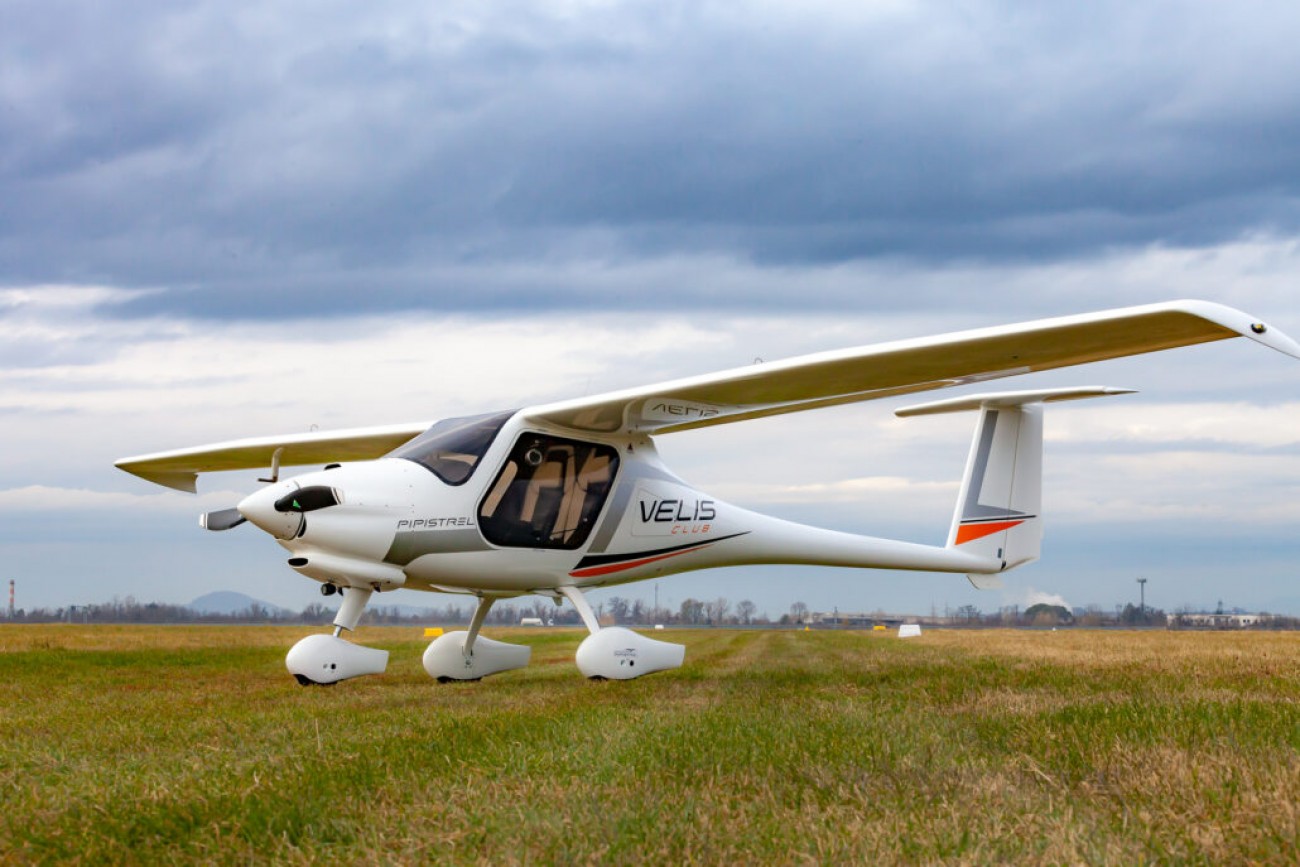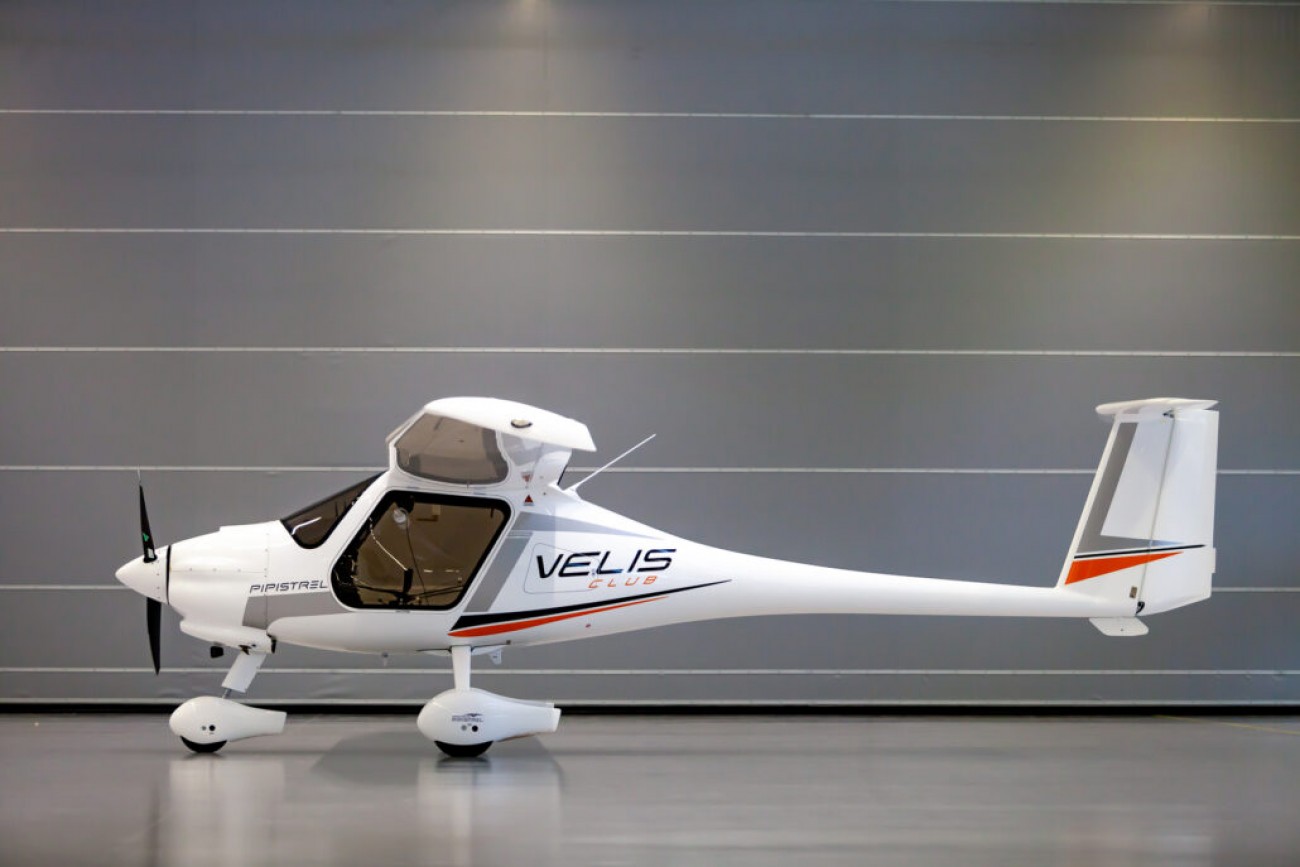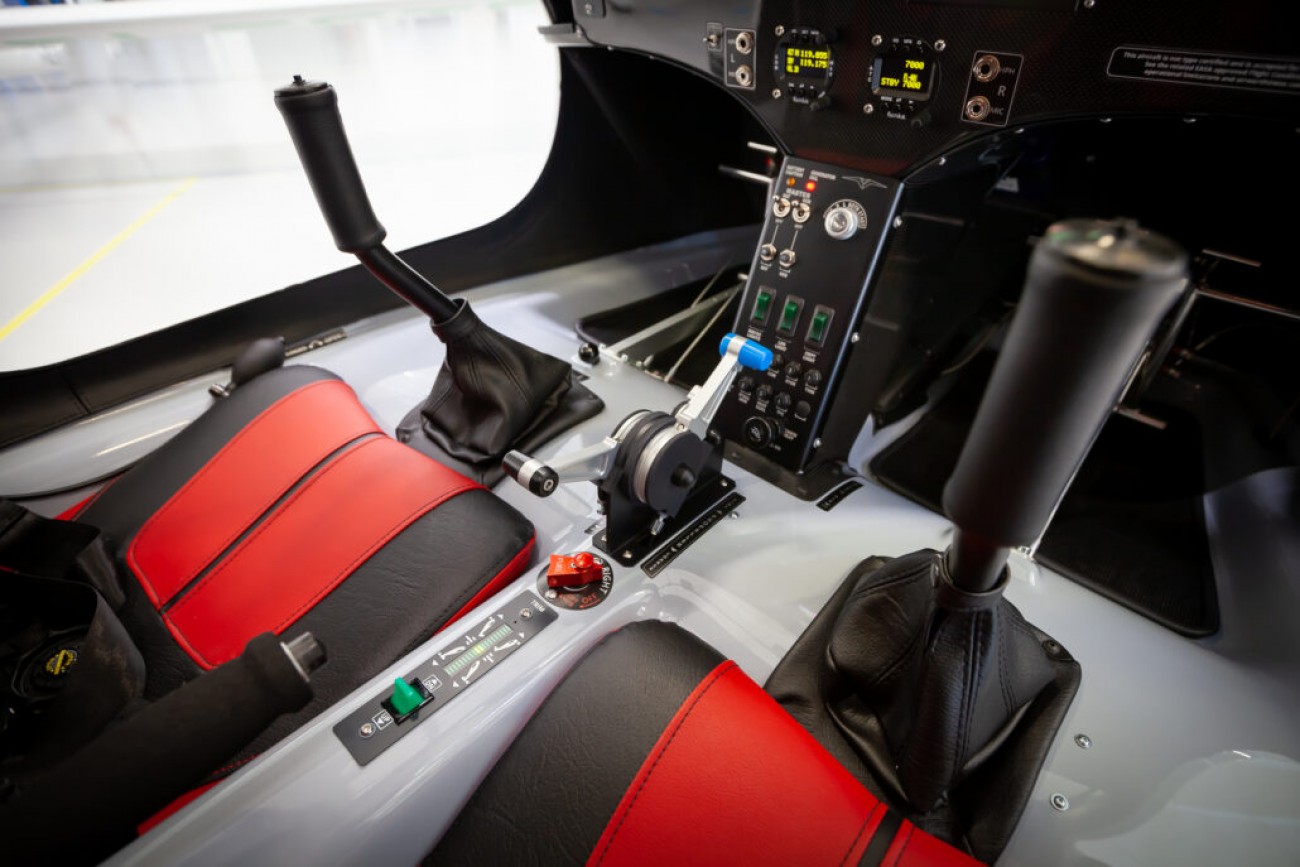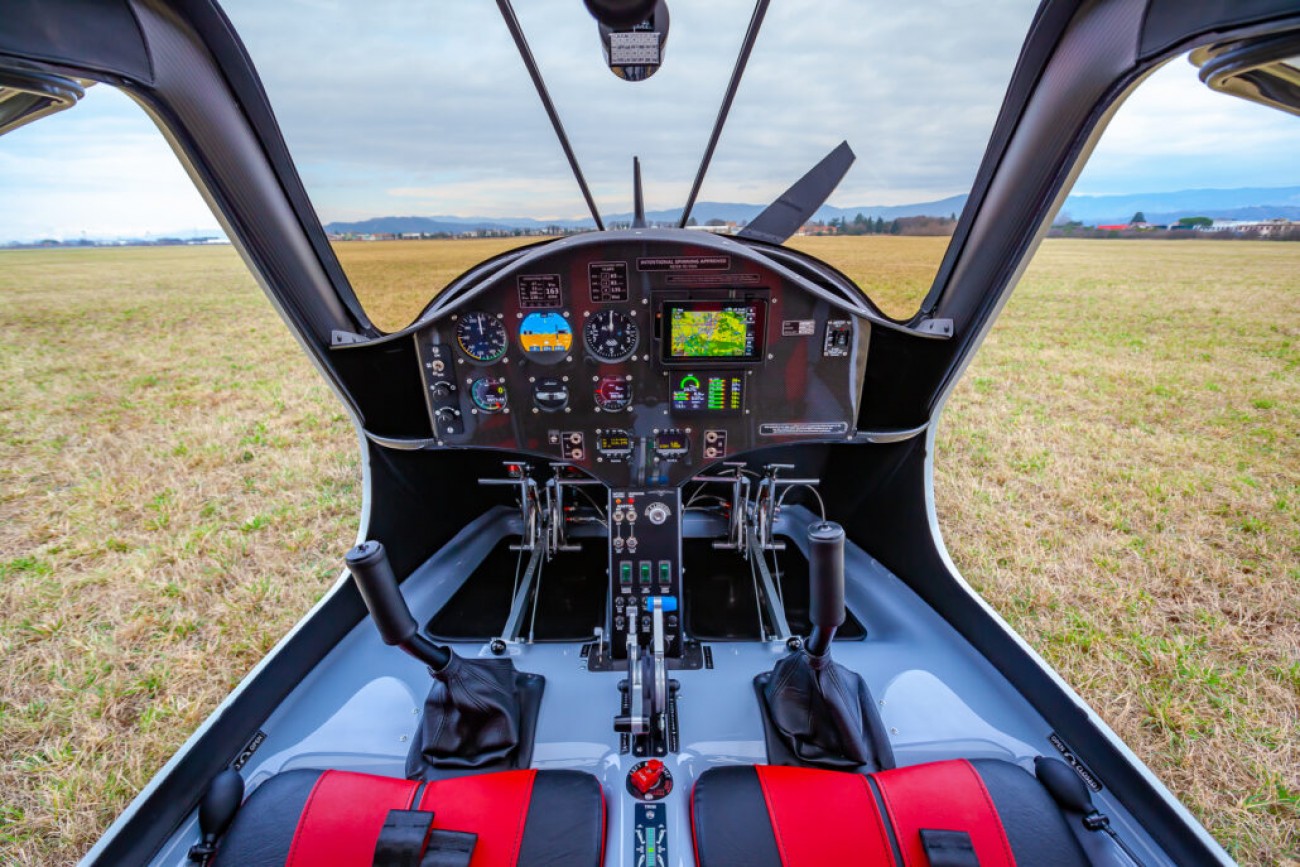Velis Club
Glider towing capability, constant-speed propeller, heavy-duty landing gear, exceptional outside visibility, and reliable avionics.
High-performance cruiser with outstanding cross-country capabilities.
Ideal for all-round pilot training as a complement of the Velis Training System, but can be enjoyed separately as well.
SAFETY
EASA Type Certified aeroplane, fully approved for Day VFR operations and intentional spins.
Exceeds certification requirements by offering the parachute Ballistic Recovery System and an AoA-based stall warning system.
Demonstrated safety record of the Virus SW 121 with the same certified Rotax 4-cylinder engine.
LOW OPERATIONAL COSTS
Affordable to acquire and operate, it is the ideal solution for all club needs, including pilot training and cross country flying
Excellent performance and low fuel consumption
Optional equipment and features let you adapt the Velis Club to your budget
#pipistrel #velis #velisclub
Category
Flight Training
ENGINE ROTAX
Rotax 912 S3, EASA certified engine
DESCRIPTION
Versatility |
The Velis Club suits a wide range of uses from basic flight instruction, to glider towing, and long-range cross-country flying with unbeatable performance.The Club is the essential element of the Velis Training System, complementing the Velis Electro and the Velis VR simulator to cover all the areas of basic and advanced pilot training. The exceptional outside visibility, together with the simple and reliable avionics suite, is ideal for pilots learning the fundamentals of VFR flying. Its heavy-duty landing gear is able to absorb even the hardest of the landings and permits routine operations from grass runways. Approved for intentional spins, the Velis Club is also perfectly suited for advanced UPRT training.
The constant-speed variable-pitch propeller brings faster cruise speeds and better fuel economy. Flying at up to 132 KTAS and offering more than 1000 km of range, this fast high-performance cruiser is a fantastic aeroplane for cross-country flying. The Velis Club is also approved for glider towing with the addition of the optional glider tow hook. |
Safety |
The Velis Club, as an EASA type-certified aircraft, has demonstrated safety levels required by the CS-LSA regulation by successfully passing all the qualification tests. The Rotax 912 S3 engine, also EASA certified, is a proven powerplant with a vast operational history.Based on the excellent safety characteristics of their already certified predecessors Virus SW 121 and Velis Electro, the Velis Club incorporates additional features that enhance safety beyond what certification requires, such as the multi-sensory-path stall warning system, intentional spin approval, and the Ballistic Parachute Recovery System.
The stall warning system is based on true angle of attack measurement and consists of haptic stick vibration to the pilot’s stick, an audible alarm to the headset, and a cockpit acoustic alert. The Ballistic Parachute Rescue System by Galaxy GRS can be installed as optional equipment. The system is conceived as a second chance beyond what is required by the certification standard, and should be used when all other solutions are ineffective. |
Cost Efficiency |
The Velis Club combines the proven airframe and engine of the Virus SW 121 with the simplicity and durability of a club aeroplane, which can also be used for pilot training. The outstanding aerodynamic efficiency and robust lightweight structure of the Velis Club result in a high-performance aircraft with low fuel consumption, low cost, and low environmental footprint. Optional equipment like baggage compartment, ballistic rescue system, wheel fairings, and more, let the customizable Velis Club adapt to your budget.Contact a Pipistrel representative to learn more about how the Velis Club can lower the cost of flying in your organization. |
TECHNICAL CHARATERISTICS
| model | VIRUS SW 100 EASA LSA |
|---|---|
| ENGINE ROTAX | Rotax EASA certified engine 912S3 100 hp, |
| max power(with 2 carb.) | 100 Hp, 73,5 kW take off power |
| PROPELLER | 2 blade Hydraulic CS MTV-33-1-A/170-200 EASA certified |
| SIZES | |
| length | 6.45 m, 26.5 ft. |
| span | 10.70 m, 21.15 ft. |
| height | 2.06 m, 6.75 ft. |
| wing area | 9.51 m², 102.4 ft² |
| wing span | 10.71 m, 35.10 ft. |
| mean wing chord | 0.898 m, 2.95 ft. |
| horizontal tail area | 1.02 m², 10.9 ft² |
| span | 2.18 m, 7.15 ft. |
| vertical tail area | 1.24 m², 13.3 ft² |
| height | 1.19 m, 3.90 ft. |
| aspect ratio | 11,3 |
| positive flaps | 0°, +9°, +20°; marked (0), (+1), (+2) respectively |
| negative flaps | 5-° marked as (-) |
| center of gravity | 25% – 33% MAC |
| WEIGHTS | |
| Design empty weight | 349 kg, 768 lb |
| max take off weight (MTOW) | 600 kg, 1323 lb |
| Design useful load | 251 kg, 522 lbs |
| max baggage weight | 25 kg, 55 lb |
| fuel tanks capacity | 2 x 50 l |
| useful fuel | 2 x 49 l |
| PERFORMANCES | |
| Vne – Never Exceeded Speed | 163 KTAS |
| Vno – Max Structural Cruising Speed except in smooth air | 120 KIAS |
| Va- Max Operating Maneuvering Speed | 100 KIAS |
| Vfe- Max Flap Extended Speed | 81 KIAS |
| Vae- Max Airbrakes Extended Speed | 100 KIAS |
| stall without flaps | 50 KCAS |
| Towing limitations | glider up to 600 kg (to meet 500 m total take off distance (over 15 m obstacle) |
| best climb speed | 78 KIAS |
| max climb rate | 1050 ft./min |
| take off distance at SL | 160 m |
| take off distance over 15 m obstacle at SL | 320 m |
| Maximum take-off altitude | 10,000 ft. MSL |
| Maximum operating altitude | 16,000 ft. MSL |
| Permitted fuel | AVGAS, MOGAS or car fuel (min RON 95; EN228 Premium or Premium plus with max. 10% Ethanol) |
| fuel consumption at 2000 ft. 75% PWR cruise speed | 18,4 l/h |
| endurance @4000 ft., 65 % power) | 5h 33 min (+30 min reserve) |
| range distance (+ 30 min reserve, @4000 ft., 65 % power) | 1189 km / 642 nm |
| Noise level (ICAO Annex 16, Chapter 10) | 70 dB(A) (measured) |
| Flight Load Factor Limits | 4.0 g+, 2.0 g- |
DESCRIPTION
Versatility |
The Velis Club suits a wide range of uses from basic flight instruction, to glider towing, and long-range cross-country flying with unbeatable performance.The Club is the essential element of the Velis Training System, complementing the Velis Electro and the Velis VR simulator to cover all the areas of basic and advanced pilot training. The exceptional outside visibility, together with the simple and reliable avionics suite, is ideal for pilots learning the fundamentals of VFR flying. Its heavy-duty landing gear is able to absorb even the hardest of the landings and permits routine operations from grass runways. Approved for intentional spins, the Velis Club is also perfectly suited for advanced UPRT training.
The constant-speed variable-pitch propeller brings faster cruise speeds and better fuel economy. Flying at up to 132 KTAS and offering more than 1000 km of range, this fast high-performance cruiser is a fantastic aeroplane for cross-country flying. The Velis Club is also approved for glider towing with the addition of the optional glider tow hook. |
Safety |
The Velis Club, as an EASA type-certified aircraft, has demonstrated safety levels required by the CS-LSA regulation by successfully passing all the qualification tests. The Rotax 912 S3 engine, also EASA certified, is a proven powerplant with a vast operational history.Based on the excellent safety characteristics of their already certified predecessors Virus SW 121 and Velis Electro, the Velis Club incorporates additional features that enhance safety beyond what certification requires, such as the multi-sensory-path stall warning system, intentional spin approval, and the Ballistic Parachute Recovery System.
The stall warning system is based on true angle of attack measurement and consists of haptic stick vibration to the pilot’s stick, an audible alarm to the headset, and a cockpit acoustic alert. The Ballistic Parachute Rescue System by Galaxy GRS can be installed as optional equipment. The system is conceived as a second chance beyond what is required by the certification standard, and should be used when all other solutions are ineffective. |
Cost Efficiency |
The Velis Club combines the proven airframe and engine of the Virus SW 121 with the simplicity and durability of a club aeroplane, which can also be used for pilot training. The outstanding aerodynamic efficiency and robust lightweight structure of the Velis Club result in a high-performance aircraft with low fuel consumption, low cost, and low environmental footprint. Optional equipment like baggage compartment, ballistic rescue system, wheel fairings, and more, let the customizable Velis Club adapt to your budget.Contact a Pipistrel representative to learn more about how the Velis Club can lower the cost of flying in your organization. |
TECHNICAL CHARATERISTICS
| model | VIRUS SW 100 EASA LSA |
|---|---|
| ENGINE ROTAX | Rotax EASA certified engine 912S3 100 hp, |
| max power(with 2 carb.) | 100 Hp, 73,5 kW take off power |
| PROPELLER | 2 blade Hydraulic CS MTV-33-1-A/170-200 EASA certified |
| SIZES | |
| length | 6.45 m, 26.5 ft. |
| span | 10.70 m, 21.15 ft. |
| height | 2.06 m, 6.75 ft. |
| wing area | 9.51 m², 102.4 ft² |
| wing span | 10.71 m, 35.10 ft. |
| mean wing chord | 0.898 m, 2.95 ft. |
| horizontal tail area | 1.02 m², 10.9 ft² |
| span | 2.18 m, 7.15 ft. |
| vertical tail area | 1.24 m², 13.3 ft² |
| height | 1.19 m, 3.90 ft. |
| aspect ratio | 11,3 |
| positive flaps | 0°, +9°, +20°; marked (0), (+1), (+2) respectively |
| negative flaps | 5-° marked as (-) |
| center of gravity | 25% – 33% MAC |
| WEIGHTS | |
| Design empty weight | 349 kg, 768 lb |
| max take off weight (MTOW) | 600 kg, 1323 lb |
| Design useful load | 251 kg, 522 lbs |
| max baggage weight | 25 kg, 55 lb |
| fuel tanks capacity | 2 x 50 l |
| useful fuel | 2 x 49 l |
| PERFORMANCES | |
| Vne – Never Exceeded Speed | 163 KTAS |
| Vno – Max Structural Cruising Speed except in smooth air | 120 KIAS |
| Va- Max Operating Maneuvering Speed | 100 KIAS |
| Vfe- Max Flap Extended Speed | 81 KIAS |
| Vae- Max Airbrakes Extended Speed | 100 KIAS |
| stall without flaps | 50 KCAS |
| Towing limitations | glider up to 600 kg (to meet 500 m total take off distance (over 15 m obstacle) |
| best climb speed | 78 KIAS |
| max climb rate | 1050 ft./min |
| take off distance at SL | 160 m |
| take off distance over 15 m obstacle at SL | 320 m |
| Maximum take-off altitude | 10,000 ft. MSL |
| Maximum operating altitude | 16,000 ft. MSL |
| Permitted fuel | AVGAS, MOGAS or car fuel (min RON 95; EN228 Premium or Premium plus with max. 10% Ethanol) |
| fuel consumption at 2000 ft. 75% PWR cruise speed | 18,4 l/h |
| endurance @4000 ft., 65 % power) | 5h 33 min (+30 min reserve) |
| range distance (+ 30 min reserve, @4000 ft., 65 % power) | 1189 km / 642 nm |
| Noise level (ICAO Annex 16, Chapter 10) | 70 dB(A) (measured) |
| Flight Load Factor Limits | 4.0 g+, 2.0 g- |




